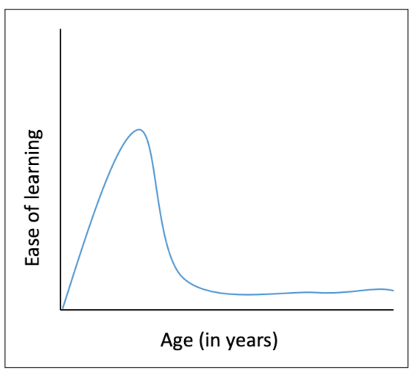Have you ever thought about “I want to be good at English?” or “people who are fluent in English have learned English since childhood?” Recently, as interest in English has risen, there is a boom in English education. EBS News recently reported that the number of English kindergartens has increased by 37% over the past four years. This phenomenon shows that we are in the craze for early English education, reflecting the belief that ‘to be proficient in English, one must start learning at a young age’. So is early English education really related to proficiency in English?
Obstacle of studying English
The Critical Period Hypothesis, which is also called CPH, lies at the core of thinking that early English education is necessary for becoming proficient in English. Critical Period Hypothesis (CPH) is the linguistic and psychological hypothesis that posits there is a critical period for acquiring a language. Eric Lenneber insisted that it is impossible to attain perfect language proficiency without learning it from age 2 to puberty. As its name suggests, CPH is just a hypothesis, not a theory. There are numerous cases that can refute CPH. For example, the case study by Loup et al. (1994) highlights an individual who learned Arabic perfectly after getting married, despite starting the language later in life. Although RM, who is a member of BTS, also studied English after the critical period, he is a fluent English speaker. Lee-ju yeon, who is a professor at the Graduate School of Interpretation and Translation (GSIT) at Hankuk University of Foreign Studies (HUFS) , also became an interpreter and became proficient in English despite starting her studies after entering university. We can notice that Critical Period Hypothesis (CPH) couldn’t be an obstacle in these cases. Critical Period Hypothesis (CPH) is introduced based on Noam Chomsky's theory, Language Acquisition Device (LAD). But we need to consider that it is introduced in America, which is in ESL (English as second language) condition. As for ESL, ESL refers to situations where people who are non-native speakers use English outside specific situations such as educational settings. However, some experts refute that early English education is not that effective because Korea is in EFL (English as a Foreign Language) condition. For example, in Lee Gwi ok and Woo-Nam hee’s research (2008), they discovered that people who are proficient in their mother tongue have a high comprehension level of English vocabulary. This discovery tells us that studying English after entering primary school isn’t late. We also need to consider the influence of early English education on children. Early English education could be effective or not depending on children. By focusing solely on early English education, we might neglect essential elements like emotional growth.

Consistency for studying English
As we can notice, the critical period is not a fundamental factor in English education. The key to studying English is consistency. English experts emphasize that consistency is crucial for language learning. Interpreter Lim-Jong Ryeong stated on the Korean TV show “You Quize on the block”, “Memorizing a lot of things and consistent studying are key to studying English.” Also, in the same program, Interpreter Sharon Choi highlighted the importance of consistency by emphasizing “Fandom(덕질) is the best method to study English” and “making it a daily habit is important”. Interpreter Lee-Ju Yeon also stressed that expanding exposure to English and studying English consistently are vital for success.

How to be good at English? I interviewed KNUE students who are good at English but not majoring in English.
Q1. Could you please share how you have been studying English in your daily life and what efforts you have made to improve your English skills?
Home Economics Education, Lee-Na Young: During my school years, I tried to increase my vocabulary by memorizing lots of English vocabulary. While I was memorizing vocabulary, I not only memorized Korean meanings but also studied part of speech changing depending on affixes, memorized synonyms and antonyms together and made sure to check examples showing the usage of vocabulary. For listening, I took notes and dictation to understand the pronunciation of connected expressions, which I found confusing. In terms of grammar, I used my vacation time to systematically study various concepts on a short-term basis. When solving grammar questions, I identified the incorrect grammatical usage, wrote the reason for the error in the margin under the problem, and then corrected it. I studied every grammatical element while working on reading comprehension. Although my reading comprehension skills were lacking, I didn't have enough time to improve them by reading books extensively. Instead, I focused on identifying cause-and-effect relationships and practiced finding key themes in texts by looking for keywords.
Chinese Education, Park-Min Jae: Studying for the TOFEL to gain admission to a Foreign language high school was effective, as it covered all the areas of English. Especially, in terms of competence, it helped me to fill in the gaps that the KSAT neglects. Also I think reading English writings, which is known as “원서” is beneficial. It is better to study entire flows of writing than studying in word or phrase levels to offset disadvantages of direct translation.
Primary education, Han-Yul: I think that I wasn’t a beginner so I regularly studied English texts and memorized vocabulary. When reading English texts, I encountered special formats and had no trouble learning new vocabulary. However, I felt that my ability to read the text organically, without relying on interpretation, was lacking. I thought that this was because of my comprehension level so I expanded my reading from topics I am interested in to difficult topics.
Q2. Consistency is important in learning English, so could you recommend content that can help with consistent English learning on a daily basis?
Home Economics Education Lee-Na Young: I originally hated English. However, when I was in the first year of middle school, I listened to Charlie Puth's song "How Long" and fell in love with the world of pop music. After that,I began following foreign singers and became a fan of actors, which helped me quickly improve my English skills. The key point in my development was listening repeatedly to the words of my favorite singers and actors and trying to mimic them. I found their accents fascinating, so I kept listening to and repeating their words. As a result, I naturally started to pick up how words connect when native speakers talk quickly, which significantly improved my listening skills. By imitating their speech, my initial awkward attempts at speaking became more natural, and I started to absorb idiomatic expressions and grammar structures without much effort.
Chinese Education, Park-Min Jae: Usually, I set my phone and computer’s language settings to English to be exposed to English. Through the setting, the title of the contents in sites translated into English title and the algorithms provide English subtitles and videos on top. At first, it was quite awkward, but after 5 years of this practice, I am now familiar with it and it has allowed me to study English expressions flowing in front of me.
Primary education, Han-Yul: I recommend English magazines. The magazines were thin so it was my hobby solving questions in the magazines when I had spare time. Generally TOEIC magazines are good, but personally, I find them less helpful for improving reading comprehension. So in this case, I think carrying around the piece of writing from TOFEL, IELTS, SAT and so on could be helpful. Additionally, I also set my phone's language to English and changed my YouTube country settings to the United States. These changes allowed me to be exposed to English more regularly in everyday situations and provided opportunities to immerse myself in the culture through the algorithm. By engaging with tailored content to American audiences, I was able to better understand cultural references and language nuances.
Here are the common responses they provided: The key points include expanding exposure to English and studying consistently. None of them empathized with early English education and they didn’t live abroad. They emphasized that consistency and trying to expand chances to be exposed to English were crucial. Early English education could help us progress, but it is not essential. Consistency is essential. When studying English, let go of the pressure of thinking, “I didn’t learn English when I was young”, and focus on the idea that consistency will lead to success.

